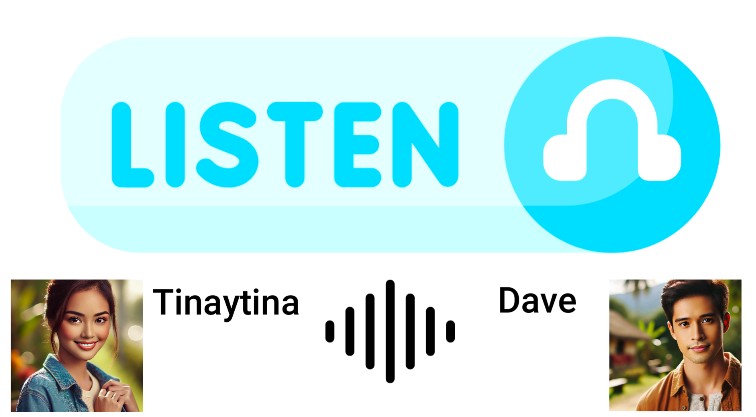Maayong adlaw, mga higala! Karon, magtuon kita unsaon pagdapit sa mga higala ug kaila sa paniudto gamit ang Cebuano. Kini nga leksyon makatabang kaninyo nga mahimong mas komportable sa pag-istorya ug pagdapit sa uban, bisan asa ug bisan kanus-a.
English
Good day, friends! Today, we will learn how to invite friends and acquaintances to lunch using Cebuano. This lesson will help you feel more comfortable speaking and inviting others, no matter where you are or when the occasion arises.
*This learning material is designed with the assumption that you will be having lessons with Filipino wife, husband, boyfriend, girlfriend, friends, or language teachers.
Let’s review this video lesson!
In this lesson, you will;
1. Learn How to invite friends or acquaintances to lunch.
2. Be able to communicate basic Cebuano conversation.
Vocabulary
Directions: Listen and repeat after your teacher.
Useful phrase for daily conversation
- Maayong udto! (Good afternoon!)
Used to greet someone in the afternoon. It’s a polite and friendly way to start a conversation during lunchtime or midday. - Kumusta ka? (How are you?)
Commonly used when you want to ask about someone’s well-being. It can be used in both casual and formal conversations. - Maayo ra ko, salamat. (I’m fine, thank you.)
A polite response to “Kumusta ka?” to let someone know you’re doing well. This is often paired with gratitude. - Ikaw, kumusta? (And you, how are you?)
A follow-up question to reciprocate interest in the other person’s well-being. Common in friendly conversations. - Hala, salamat! (Oh, thank you!)
Used to express gratitude excitingly or surprisingly, often when receiving an invitation, gift, or help.
Invitations and Responses About Food
- Gusto ka mokaon uban namo? (Would you like to eat with us?)
Typically used when inviting someone to join a meal, showing hospitality or kindness. It’s common in Filipino culture to invite others to eat together. - Ganahan kaayo ko og adobo. (I love adobo very much.)
This phrase expresses enthusiasm about adobo, a popular Filipino dish. It shows excitement or appreciation for the food being offered. - Muuban ko unya. (I’ll join later.)
This response is used to accept an invitation with the intent to join at a later time. It’s casual and friendly.
Useful Words
- Maayo (Good)
Used to describe well-being, quality, or positive situations. For example, “Maayo ra” means “I’m fine” or “It’s good.”
Example: Maayo ang panahon karong adlawa.
(The weather is good today.)
Example: Maayo ra ko, salamat.
(I’m fine, thank you.)
- Salamat (Thank you)
A simple and versatile way to express gratitude in any situation.
Example: Salamat sa imong tabang.
(Thank you for your help.)
Example: Salamat sa pag-imbitar.
(Thank you for the invitation.)
- Ganahan (Like or love)
Used to express liking or preference for something. For instance, “Ganahan ko.” means “I like it.”
Example: Ganahan ka ba og kape?
(Do you like coffee?)
Example: Ganahan ko sa imong giingon.
(I like what you said.)
- Uban (With)
Used to indicate companionship or togetherness. For example, “Uban namo” means “with us.”
Example: Muuban ko sa inyo karong gabii.
(I’ll go with you tonight.)
Example: Gusto ka mokaon uban namo?
(Would you like to eat with us?)
- Unya (Later)
Commonly used to refer to something happening at a later time. It’s often used in casual conversations about plans.
Example: Magkita ta unya sa merkado.
(Let’s meet later at the market.)
Example: Muuban ko unya sa paniudto.
(I’ll join later for lunch.)
- Paniudto (Lunch)
Refers specifically to the midday meal. Often used when discussing or inviting someone to eat lunch.
Example: Unsa imong sud-an sa paniudto?
(What’s your dish for lunch?)
Example: Mangaon ta og paniudto unya.
(Let’s have lunch later.)
Dialogue Practice
Directions: Read the following conversation with your teacher.
Dave: Maayong udto! Kumusta ka?
Tinaytina: Maayong udto sad! Maayo ra ko, salamat. Ikaw, kumusta?
Dave: Maayo man sad. Nagluto ko og adobo para sa paniudto. Gusto ka mokaon uban namo?
Tinaytina: Hala, salamat! Ganahan kaayo ko og adobo. Muuban ko unya.
Dave: Good afternoon! How are you?
Tinaytina: Good afternoon, too! I’m fine, thank you. How about you?
Dave: I’m good as well. I cooked adobo for lunch. Would you like to join us?
Tinaytina: Wow, thank you! I love adobo. I’ll join you later.)
Questions:
Directions: Answer the questions about the story.
1. Unsa ang gisulti ni Dave sa pagpanimbaya kang Tinaytina?
What did Dave say to greet Tinaytina?
2. Unsa ang plano ni Dave buhaton karong adlawa?
What does Dave plan to do today?
3. Giunsa pagtubag ni Tinaytina ang plano ni Dave?
How did Tinaytina respond to Dave’s plan?
Answers
1. Unsa ang gisulti ni Dave sa pagpanimbaya kang Tinaytina?
Nag-ingon si Dave, “Maayong udto! Kumusta ka?”
(Dave said, “Good noon! How are you?”)
2. Unsa ang plano ni Dave buhaton karong adlawa?
Magluto siya og adobo ug magdapit kang Tinaytina mokaon.
(He plans to cook adobo and invite Tinaytina to eat.)
3. Giunsa pagtubag ni Tinaytina ang plano ni Dave?
Miingon siya nga ganahan siya og adobo ug muuban siya.
(She said she loves Adobo and will join.)
Exercise
Arrange the words to make sentences.
- ra / Maayo / ko / sad / Maayong / salamat / udto
- man / sad / Maayo
- og / paniudto / sa / adobo / para / Nagluto / ko
- kaayo / og / adobo / ko / Ganahan
- mokaon / uban / ka / Gusto / namo / ka
Fill-in-the-Blank Questions
Fill in the blanks to complete the natural Cebuano conversation.
Question 1:
Dave: Maayong udto! __________ ka?
(Hint: After the greeting, insert a word that means “How are you?”)
Question 2:
Tinaytina: Maayong __________ sad! Maayo ra ko, salamat.
(Hint: Part of the greeting, insert a word that means “noon” or “midday.”)
Question 3:
Dave: Nagluto ko og __________ para sa paniudto.
(Hint: Insert the name of a popular Filipino dish.)
Question 4:
Tinaytina: __________, salamat! Ganahan kaayo ko og adobo.
(Hint: Insert an exclamation expressing surprise or gratitude.)
Question 5:
Dave: Gusto ka __________ uban namo?
(Hint: Insert the verb form meaning “to eat.”)
Phrase Matching Quiz
Match the numbered Cebuano phrases on the left with the lettered English meanings on the right to complete the conversation.
| Cebuano | Meaning |
| 1. Maayong udto! | A. I cooked adobo for lunch. |
| 2. Maayo ra ko, salamat. | B. Yes, I would love to eat with you. |
| 3. Nagluto ko og adobo para sa paniudto. | C. Good afternoon to you too! |
| 4. Gusto ka mokaon uban namo? | D. Thank you! I love adobo! |
| 5. Hala, salamat! Ganahan kaayo ko og adobo. | E. How are you? |
Answers
Here are the correct sentences:
- Maayong udto sad! Maayo ra ko, salamat.
- Maayo man sad.
- Nagluto ko og adobo para sa paniudto.
- Ganahan kaayo ko og adobo.
- Gusto ka mokaon uban namo?
Here are the correct answers for the Fill-in-the-Blank Questions:
Question 1:
Dave: Maayong udto! Kumusta ka?
(Answer: Kumusta)
Question 2:
Tinaytina: Maayong udto sad! Maayo ra ko, salamat.
(Answer: udto)
Question 3:
Dave: Nagluto ko og adobo para sa paniudto.
(Answer: adobo)
Question 4:
Tinaytina: Hala, salamat! Ganahan kaayo ko og adobo.
(Answer: Hala)
Question 5:
Dave: Gusto ka mokaon uban namo?
(Answer: mokaon)
Here are the correct answers for the Phrase Matching Quiz:
| Cebuano Phrases | Correct Matching Letter |
| 1. Maayong udto! | E |
| 2. Maayo ra ko, salamat. | C |
| 3. Nagluto ko og adobo para sa paniudto. | A |
| 4. Gusto ka mokaon uban namo? | B |
| 5. Hala, salamat! Ganahan kaayo ko og adobo. | D |
Parts of speech breakdown, explanations of each word, and example sentences
1. Dave: Maayong udto! Kumusta ka?
- Word Breakdown:
- Maayong
- Part of Speech: Adjective
- Meaning: Good, pleasant.
- Example: Maayong buntag! (Good morning!)
- Udto
- Part of Speech: Noun
- Meaning: Noon, midday.
- Example: Maayong udto! (Good noon!)
- Kumusta
- Part of Speech: Interjection
- Meaning: How are you?
- Example: Kumusta ka karon? (How are you today?)
- Ka
- Part of Speech: Pronoun (Second Person Singular)
- Meaning: You.
- Example: Kumusta ka? (How are you?)
- Maayong
- Usage: A polite midday greeting followed by asking someone’s condition.
- Example:
- Maayong udto! Kumusta imong adlaw?
(Good noon! How’s your day?)
- Maayong udto! Kumusta imong adlaw?
2. Tinaytina: Maayong udto sad! Maayo ra ko, salamat. Ikaw, kumusta?
- Word Breakdown:
- Sad
- Part of Speech: Adverb
- Meaning: Too, also.
- Example: Maayong buntag sad! (Good morning too!)
- Maayo
- Part of Speech: Adjective
- Meaning: Good, fine.
- Example: Maayo ra ko. (I’m fine.)
- Ra
- Part of Speech: Particle
- Meaning: Just, only.
- Example: Okay ra. (It’s just fine.)
- Ko
- Part of Speech: Pronoun (First Person Singular)
- Meaning: I, me.
- Example: Nagtrabaho ra ko karon. (I’m just working right now.)
- Salamat
- Part of Speech: Interjection
- Meaning: Thank you.
- Example: Daghang salamat! (Thank you very much.)
- Ikaw
- Part of Speech: Pronoun (Second Person Singular)
- Meaning: You.
- Example: Ikaw, kumusta ka? (And you, how are you?)
- Sad
- Usage: A polite reply to a greeting, followed by asking how the other person is.
- Example:
- Maayo ra ko, salamat. Ikaw, kumusta?
(I’m fine, thank you. And you?)
- Maayo ra ko, salamat. Ikaw, kumusta?
3. Dave: Maayo man sad. Nagluto ko og adobo para sa paniudto. Gusto ka mokaon uban namo?
- Word Breakdown:
- Man
- Part of Speech: Particle
- Meaning: Indeed, for emphasis.
- Example: Maayo man kaayo ang panahon. (The weather is indeed very nice.)
- Nagluto
- Part of Speech: Verb (Past Progressive)
- Meaning: Cooked.
- Example: Nagluto siya og pasta kagahapon. (He/She cooked pasta yesterday.)
- Ko
- (See above.)
- Og
- Part of Speech: Preposition
- Meaning: Of, used to specify the object of the action.
- Example: Nagluto siya og tinola. (He/She cooked tinola.)
- Adobo
- Part of Speech: Noun
- Meaning: Adobo, a popular Filipino dish.
- Example: Ganahan kaayo ko sa adobo. (I really like adobo.)
- Para sa
- Part of Speech: Preposition
- Meaning: For.
- Example: Para sa imong kauban. (For your companion.)
- Paniudto
- Part of Speech: Noun
- Meaning: Lunch.
- Example: Unya nalang ta mokaon sa paniudto. (Let’s eat lunch later.)
- Gusto
- Part of Speech: Verb (Present Tense)
- Meaning: Want.
- Example: Gusto ko mokaon og isda. (I want to eat fish.)
- Mokaon
- Part of Speech: Verb (Future or Intentional Tense)
- Meaning: To eat.
- Example: Ganahan ka mokaon uban namo? (Do you want to eat with us?)
- Uban
- Part of Speech: Preposition
- Meaning: With.
- Example: Uban ka nako? (Are you coming with me?)
- Namo
- Part of Speech: Pronoun (First Person Plural Exclusive)
- Meaning: Us.
- Example: Kuyog namo unya. (Join us later.)
- Man
- Usage: Used to invite someone to eat or share a meal.
- Example:
- Gusto ka mokaon og adobo uban namo?
(Do you want to eat adobo with us?)
- Gusto ka mokaon og adobo uban namo?
4. Tinaytina: Hala, salamat! Ganahan kaayo ko og adobo. Muuban ko unya.
- Word Breakdown:
- Hala
- Part of Speech: Interjection
- Meaning: Wow, an exclamation of surprise or delight.
- Example: Hala, nindot kaayo! (Wow, that’s so nice!)
- Ganahan
- (See above.)
- Kaayo
- Part of Speech: Adverb
- Meaning: Very, extremely.
- Example: Ganahan kaayo siya og tsokolate. (He/She really likes chocolate.)
- Og
- (See above.)
- Muuban
- Part of Speech: Verb (Future or Intentional Tense)
- Meaning: To join, to go with.
- Example: Muuban ka ba sa among lakaw? (Will you join us on our trip?)
- Unya
- Part of Speech: Adverb
- Meaning: Later.
- Example: Magkita ta unya. (Let’s meet later.)
- Hala
- Usage: Used to express excitement, gratitude, or willingness to join.
- Example:
- Hala, salamat! Muuban ko unya.
(Wow, thank you! I’ll join later.)
- Hala, salamat! Muuban ko unya.
Feel free to leave a comment with any requests or questions you may have. We’re always happy to hear from you!





Comment